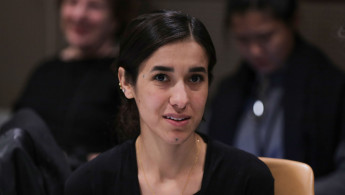Nobel peace prize winner wants IS militants to face trial
Nadia Murad, a former prisoner of IS and Nobel peace prize winner, said she would rather militants face trial rather than death.
2 min read
Murad said she hopes all survivors of sexual assault will be heard (Getty)
Nobel peace prize winner Nadia Murad wants to see members of the Islamic State group face justice - not death, but trial in a courtroom, she said on Monday.
Murad was one of thousands of young women from the Yazidi religious minority who were kidnapped by IS in Iraq four years ago and held in sexual slavery, but was able to escape.
Older women and men faced summary execution during the IS assault on the Yazidis, which the United Nations has described as a genocide.
"For me, justice doesn't mean killing all of the Daesh members who committed these crimes against us," she said at the National Press Club in Washington, using an Arabic acronym for IS.
"Justice for me is taking Daesh members to a court of law and seeing them in court admitting to the crimes they committed against Yazidis and being punished for those crimes specifically," she said.
Many IS members have been killed on battlefields of Iraq and Syria, while those who do make it to court in Iraq are usually tried on terrorism charges.
Murad was jointly awarded the Nobel peace prize on Friday along with Congolese doctor Denis Mukwege "for their efforts to end the use of sexual violence as a weapon of war and armed conflict."
She said she aims to defend persecuted peoples and victims of sexual violence in the Middle East and around the world, but that she cannot do it alone.
"A single prize and a single person cannot accomplish these goals. We need an international effort," she said.
"I call on all governments to fight genocide and sexual violence. The world should bear its moral and legal responsibility and ensure proper and fair accountability."
Speaking about her home country, Murad said she hopes Iraq will soon have a new government after months of political deadlock.
"Our hope is that the new government of Iraq will be established soon and we can work with them to make sure that the areas that have suffered the most like Sinjar are being rebuilt and people can go back to their homes," she said, referring to the ancestral hub of the Yazidis in the country's north.
Responding to a question about the "Me Too" movement and its potential to bring change, Murad said she hopes all survivors of sexual assault will be heard.
"My hope is that all women who speak about their experience of sexual violence are heard and accepted ... and they feel safe to share their stories and feel safe to speak about their experiences."
Murad was one of thousands of young women from the Yazidi religious minority who were kidnapped by IS in Iraq four years ago and held in sexual slavery, but was able to escape.
Older women and men faced summary execution during the IS assault on the Yazidis, which the United Nations has described as a genocide.
"For me, justice doesn't mean killing all of the Daesh members who committed these crimes against us," she said at the National Press Club in Washington, using an Arabic acronym for IS.
"Justice for me is taking Daesh members to a court of law and seeing them in court admitting to the crimes they committed against Yazidis and being punished for those crimes specifically," she said.
Many IS members have been killed on battlefields of Iraq and Syria, while those who do make it to court in Iraq are usually tried on terrorism charges.
Murad was jointly awarded the Nobel peace prize on Friday along with Congolese doctor Denis Mukwege "for their efforts to end the use of sexual violence as a weapon of war and armed conflict."
She said she aims to defend persecuted peoples and victims of sexual violence in the Middle East and around the world, but that she cannot do it alone.
"A single prize and a single person cannot accomplish these goals. We need an international effort," she said.
"I call on all governments to fight genocide and sexual violence. The world should bear its moral and legal responsibility and ensure proper and fair accountability."
Speaking about her home country, Murad said she hopes Iraq will soon have a new government after months of political deadlock.
"Our hope is that the new government of Iraq will be established soon and we can work with them to make sure that the areas that have suffered the most like Sinjar are being rebuilt and people can go back to their homes," she said, referring to the ancestral hub of the Yazidis in the country's north.
Responding to a question about the "Me Too" movement and its potential to bring change, Murad said she hopes all survivors of sexual assault will be heard.
"My hope is that all women who speak about their experience of sexual violence are heard and accepted ... and they feel safe to share their stories and feel safe to speak about their experiences."





 Follow the Middle East's top stories in English at The New Arab on Google News
Follow the Middle East's top stories in English at The New Arab on Google News


